
Below is an interview which first appeared in Crystal Serenades' Monthly Writing Magazine November 2003.
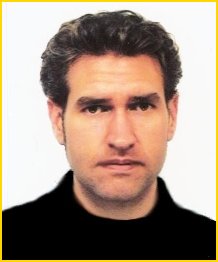
Kelly Burnell:To start off, I would like to thank you for sparing us a few minutes and agreeing to this interview. To get our readers more familiar with you, please could you tell us a little about yourself and your work.
Paul Kane: It's my pleasure; thanks for asking me. Okay then, here goes: My name's Paul Kane and I chiefly write horror and dark fantasy. I've been writing all my life, but didn't go professional until 1996 when I started submitting articles and reviews to news-stand magazines, and set myself up as a freelance writer. A couple of years later I began producing the fiction stuff and since then I've had dozens of stories published in magazines and anthologies, and I've been lucky enough to have three print collections published and one e-book: I'm also a lecturer and teach painting, creative writing and some film/media studies. So I have a special interest in the arts and cinema as well.
Kelly Burnell:Has it always been horror and dark fantasy stories for you, or did you start off with a different genre?
Paul Kane: When I first started reading books for pleasure at school, the horror and dark fantasy publications were the ones that attracted me more than any others. I was notorious for it; Paul and his horror books, usually anything by James Herbert, Clive Barker or Stephen King. In fact whenever I meet up with old friends from those days they smile a very knowing smile when I tell them what I'm up to. And when I was reunited with a very close friend from college, the first thing she said to me when she found out was, 'I knew it. I just knew it!' I've got my parents to thank for this I suppose, because they used to let me stay up and watch all the scary stuff on telly. Although it frightened the life out of me at times (like watching the remake of Invasion of the Body Snatchers when I was about eight!) it made me realise how powerful the genre could be, and how it could speak about so many different subjects, on so many levels. Having said all that, I also used to read a lot of comedy novels in my youth. I've always had the gift of being able to make people laugh, so I loved the work of writers like Douglas Adams and Terry Pratchett too. This probably accounts for why I've dabbled in comedy writing and even comedy horror.
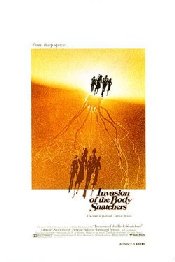
Kelly Burnell: When did you realise that you were in with a chance of being published and what channels did you take to get where you are today?
Paul Kane: I don't think I realised I was in with a chance until I actually started being published. Before then I was just tinkering around with ideas and paragraphs, but nothing that seemed to gel. I wrote a lot of rubbish when I was in my teens that I never sent anywhere or did anything with. It simply wasn't good enough. Plus I didn't really want to go into writing at the time, I wanted to do something with my drawing, which is how I ended up on an art course at college. Later on, after doing the non-fiction work, I thought about picking up the story writing again, and doing a correspondence course gave me enough confidence to send out that first short to Terror Tales. My tutor, a lovely lady called Claire O'Brien, said that she enjoyed the tale, so I thought 'what the hell!' It was actually a toss up between sending it to a short story competition or to TT, but I'm glad I chose the latter as everything seemed to come from that one submission. I was invited to local and national writers gatherings, met lots of contacts that have stood me in good stead, and just basically plugged away trying to place as much material as I could in the magazines around at that time. So the channels I used were these small press routes, which were a kind of rites of passage for me, a testing ground where I could find my feet and develop my writing - something I don't think you ever stop doing.
Kelly Burnell: If I am correct, your first piece to be published was 'The Cave Of Lost Souls' how did it feel to finally see your name in print?
Paul Kane: Well, '…Lost Souls' was the first short I had accepted by a magazine, and that was for John B. Ford's Terror Tales back in early 1998. But such was the number of submissions for the mag, mine didn't get published until a year later as part of their special Christmas edition. In the meantime I subbed a number of stories to other small press magazines and had one accepted by Planet Prozak called 'Facades', which they bought for actual money. I couldn't believe it! It wasn't much, but enough to make me think that I was possibly on the right track with my writing. I couldn't stop grinning for a week after that. There was only about a month between it being accepted and published and that saw print around Autumn 1998, so technically it was the first story of mine that went into print. It really narks John now because although he can say he discovered me, he can't lay claim to that first story credit! Both stories were connected thematically, as they involved examinations of love and loss; a subject I still write a lot about. '…Lost Souls' was all about a widower who blamed himself for the death of his wife, and is on the verge of ending it all until he receives a wake up call from the grave. 'Facades' involves a man becoming infatuated with a sculptress who is just using him, and when she gets bored…Well, let's just say it's not pleasant. It felt great to finally see my name in print, as both were really professional-looking magazines. I was also very honoured to feature alongside some of the small press' most prestigious talents, and even some writers I'd admired when I started out. That feeling never goes away, even now. I always get a thrill out of seeing my name under the title of a story.
Kelly Burnell:Do you possess any formal qualifications or have you sat any courses which have helped your writing career?
Paul Kane: Both the BA (Hons) History of Art, Design and Film and MA in Film Studies helped me because I was writing all the time for those courses, as they were pure theory. They trained me and gave me 'writing discipline' if you like. The Film Studies came in useful for the review and non-fiction work for Wallflower too. I also took units in 'Professional Writing' and 'Writing for Film' on the BA course, which gave me more pointers - I even ended up doing some work for the Daily Mirror newspaper, and the layout stuff I learnt in the Film Writing unit was invaluable when it came to writing scripts later. Indirectly my certificates in Art and Design, Proofreading and Word Processing were very useful, as well as the writing correspondence course I mentioned before. But basically I don't think you need to have any formal qualifications whatsoever to write. All you need is a basic grasp of grammar and language, tons of determination and a passion for what you're doing. I ended up taking the academic path for various reasons, but there are many hugely successful writers out there who didn't. I suppose what I'm saying is that it's different for everyone.
Kelly Burnell: What keeps you writing and what do you think are the pro's & con's of being a published writer?
Paul Kane: Stephen King once said that even if he wasn't being paid to write and even if nobody was seeing his work, he'd still carry on writing. And that sums up the essence of a writer I think. I have to write. There's a little voice inside that nags me to write if I haven't done any for a while, so I get on with it. Of course, I love writing, which helps, but even when things aren't going so well with a certain story or book, that voice drives me on. It also spurs me on to think that people are actually reading my work and - hopefully - enjoying it. When readers voted my story 'Astral' one of their favourites published in the Dream Zone in 1999, for instance, or when you get positive feedback via e-mail or at conventions, it encourages you to press on, to do the best you can because you don't want to let anyone down. One thing it's never been about for me is an ego trip. I don't do what I do because I want to be famous or the best writer out there - if you approach your writing from this angle you're bound to fail at the first hurdle, because there's always going to be someone bigger and better than you are. I prefer to take inspiration from other people's success and just get on with what I'm doing. I try to be the best I can possibly be, which is a very different thing. Jealousy and spite are negative emotions, and greed is a terrible thing. Don't let them colour your work or it'll shine through in the stories. Which leads me to the pro's and con's. I'll take the con's first. Being published means you're bound to get your critics. You won't be able to please all of the people all of the time - it's impossible. So when I get a bad review I just chalk it up to one person's opinion and remind myself that there are other readers who do like my stuff. You'll also encounter people who are not all they appear to be, just like in any business; but you learn from your mistakes. I'm very careful these days when I meet people not to give too much away and allow them to take me for who I am as a person first. Thankfully the pro's outweigh these cons. I've got to know some extremely nice people in the last five or six years, many I would count as true friends, some even as family. I've even been on holiday with a few of them! Add to this the satisfaction you feel at having your work published and the knowledge that you're entertaining your readers, and it's really one of the best professions you could wish for. I was once told by a famous writer that he'd had a letter from a wheelchair-bound reader who didn't get out of the house much. But thanks to the stories he read in the author's books, he could escape to all kinds of worlds and experience things in his imagination that no-one else could. Having an invalid father myself, I can certainly understand how much those stories meant to him, and receiving letters like that must surely be the pinnacle of any writer's career. Forget the accolades and pats on the back; that's what it's all about, when you get right down to it.
Kelly Burnell: Do you have any special writing practices which you use when creating a story and how do you go about finding inspirations?
Paul Kane: I don't have any specific writing practices. I just sit down and try to write. Obviously I do as much research as possible before starting, I get to know my characters as well as I can and rough out an outline of the story so I know vaguely where I'm going with it - which often changes as I go along. I also like to write in a certain place, which is something I talk about a lot in my creative writing classes. It's your writing space, somewhere you feel comfortable, somewhere you associate with writing. For me, it's at my desk - or if I'm on the move, then I have to make do with wherever I can set up my laptop! Generally speaking though, I do my best work in familiar surroundings. If I get stuck with a story, or even if I'm having trouble getting started, I do some word association exercises, or go for a walk and let my subconscious come up with solutions. I'm also a great believer in the hypnagogic state, which is the state you find yourself in between waking and sleep. Sort of like when you're watching an episode of Neighbours. This is when all the juicy ideas come to you…I've had entire plots for stories creep into my brain while I'm in the hypnagogic state. In terms of inspirations, I look at newspapers, watch documentaries and the news. I keep my ear to the ground and my eyes open when I'm out and about. Ideas can come to you at any time, anywhere, sparked off by a pieces of conversation or even just a name. This is where is pays dividends to carry a little hardback notebook around with you so you can jot things down.
Kelly Burnell:Your first collection of dark stories to be released was Alone (In The Dark) back in 2001, this was followed by Touching The Flame in 2002. How did the public react to these books and if you could do it all over again, what would you have done differently if anything?
Paul Kane:Alone (In the Dark) was a limited edition collection and sold out of its print run very quickly; so it's now become a bit of a collector's item rarity. Flame had a much larger print run and was on sale in certain branches of Smiths and other bookstores, and on Amazon, so I've had more response about that one than anything - and it's been very positive on the whole. I wouldn't do anything differently I don't think, because things worked out better than I'd hoped. It was originally going to be published by a US company in 1999 or 2000, but they disappeared without a trace as they sometimes do. But I'm glad they did now because two years later I got the chance to bring out a much longer edition (80,000 words as opposed to only 50,000) with much higher production values and definitely much better distribution - which counts for a great deal. Actually, it's John again who handles the distribution for my books and does a cracking job, so like I said before, if I hadn't sent that story in to him…It's strange, but I think everything does happen for a reason, and though you might think you've been kicked in the teeth and you're completely miserable when things don't go your way, you can look back and see how everything really did work out for the best in the long run.
Kelly Burnell: You released FunnyBones recently, which was a collection of your more humorous horror stories. How is this going so far?
Paul Kane: Great thanks. To my knowledge not that many writers are doing humorous horror stories, so I've got a bit of an open playing field. The launch was in London at the beginning of October and it seemed to get a good response - especially after I did a reading of 'Dracula in Love' in a Bela Lugosi voice! I'm even being pestered to do an audio version now…Perhaps if I have too much vodka again. But yes, I'm really pleased with the way the book has been received so far. I had a good time writing it and I think that comes across in the stories. It also features a couple of stories that were in the original Alone (In the Dark) book, for people who didn't pick that one up in time.
Kelly Burnell: Apart from books, you have also written an e-book,Master Of The White Worms, which is based on Dalton Quayle, a detective. What made you release an e-book and are there any plans to release it in printed format?
Paul Kane: The e-book is actually made up of two of the Quayle stories featured in FunnyBones, as both versions are by Creative Guy Publishing, so they're available in both formats now. The plan is to release the other novella from FunnyBones as a second e-book extra too, complete with additional material you don't get with the printed book, such as interviews, articles and picture galleries. The idea is for it to be like a DVD in a way, with bonus extras. Quayle's a character I have a real soft spot for. He's a spoof of Holmes, with copious amounts of Brian Lumley's Crow, Hope Hodgson's Carnacki and Biggles thrown in for good measure. His partner is the bumbling Dr Pemberton, who transcribes all the tales and always ends up getting them both into fixes. The stories have all kinds of cultural references in them, from horror ones like Silence of the Lambs, to great British comedy institutions like Blackadder and Monty Python. In fact you can have as much fun spotting these as you can reading the jokes. Someone said to me the other day that they're the first Post Modern humorous horror stories ever written and I'll go along with that. When I tell you the other story titles are 'The Sheepshank Revelation' and 'Temple of Deadly Danger', you'll probably get the general idea.
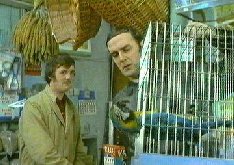
Kelly Burnell: You are currently working on a book about the film Hellraiser, which was based on the novella by Clive Barker. Is this your first attempt at writing a full-length non-fiction book and if so, how do you find it and do you see yourself doing it again?
Paul Kane:Yes, it's my first go at a non-fiction book - and what a place to start! It's quite a responsibility as I've been such a massive fan of Clive's work for more years than I care to remember. He's one of the reasons why I'm in this game in the first place. But at the same time I'm over the moon to be given the opportunity to write about his most famous mythos. I've obviously done a lot of article and review writing in the past, and also contributed to Wallflower Press' A-Z of Contemporary North American Directors, which is how I came to be involved in the project in the first place, so I've got a decent grounding in non-fiction. That's even before you count all the essays and dissertations I've done. I started researching the Hellraiser book at the start of 2003 and have written the bulk of it now. Because I'm so into the subject matter, I didn't find it that hard to write about. I think I've managed to come up with some new angles, as well. I've shown chapters to various Barker fans - and I'm talking real Barker fans - and they've said that I've raised certain issues and topics they hadn't noticed before. Anyway, we'll see. At the moment I'm waiting on an important interview, but I can't say too much at this point. And yes, I've got plans to do some more film books in the future if this one goes down well. So fingers crossed.
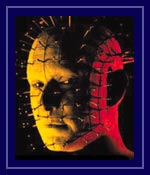
Kelly Burnell:One of your stories 'The Within' was shot as a short independent film. Can you tell us a little more about this and how it come about?
Paul Kane:The Within has actually been put on hold and is waiting to be edited. I can't say any more than that at present. But it was an interesting experience, definitely, and I had a good time hanging around as it was filmed. It revolves around a thug who visits a spooky old house with the intention of doing some damage and gets more than he bargained for. It gave me an insight into film writing and production though, so this year I've been working on a couple of projects with a new friend of mine called Martin Roberts who's actually a BBC award nominee. I first met Martin when he came over to interview myself, John B. Ford and Derek Fox for a horror documentary. We got chatting, found we had similar tastes in films and fiction, and so he asked me to come up with some scripts - which I did. 'Confidence' is all about a therapy session from hell, and 'The Opportunity' is based on one of my short stories, a short serial killer chiller with a sting in the tail. (Note: Since going to press, Paul has also been involved in scripting a full-length movie and is due to co-write a film soon with a big name in the industry).
Kelly Burnell:Not only are you a writer, but a talented artist. Have you had any art formally published and if so how did this come about?
Paul Kane:I've always loved art. It's such an immediate expression of what you're thinking or how you're feeling. Some of my work went on a tour around Europe after college - a combination of photography and painting - and my paintings have been exhibited in a couple of small galleries in the past. I was actually approached and asked if I wanted to sell some pieces but didn't want to part with them at the time. These were oil paintings on canvas and had particular meaning for me. It'd be easier I suppose if you could print off dozens of them, like you can with stories, but each one of my paintings is unique and special to me. Now, of course, I'm actually teaching people to draw and paint as well, which I'm thoroughly enjoying. In terms of having any art published, I've had various cartoons and illustrations published in magazines - my favourites were the film caricatures - and I used to do greetings cards as well.
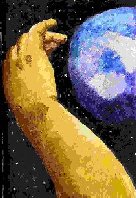
Kelly Burnell:To end the interview, is there any advice you could give to our aspiring writers and artists?
Paul Kane:Just keep at it, never give up or throw in the towel. If you want to write - or paint, or make films even - do it. There are no rules, no set guidelines for doing anything. The only way to get your stuff out there and get it seen, is to keep producing it, keep working at it, and get your name bandied about. Don't worry if you get rejected or if it seems to be taking a while, if you've enough drive or determination you can make anything happen. Remind yourself that even writers like James Herbert and J.K. Rowling had their manuscripts rejected initially - yet they persisted. But the best advice I can possibly give is simply to enjoy what you're doing; then the words will flow and the brush strokes will be vibrant.
Kelly Burnell:Thank you Paul.
Paul Kane:Thanks Kelly.
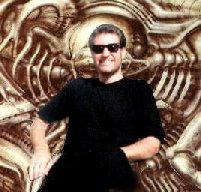
(C) Crystal Serenades 2003